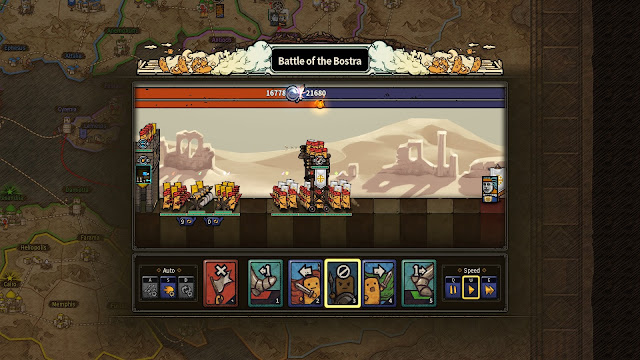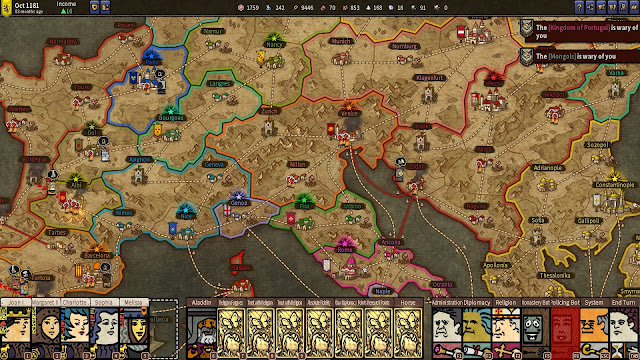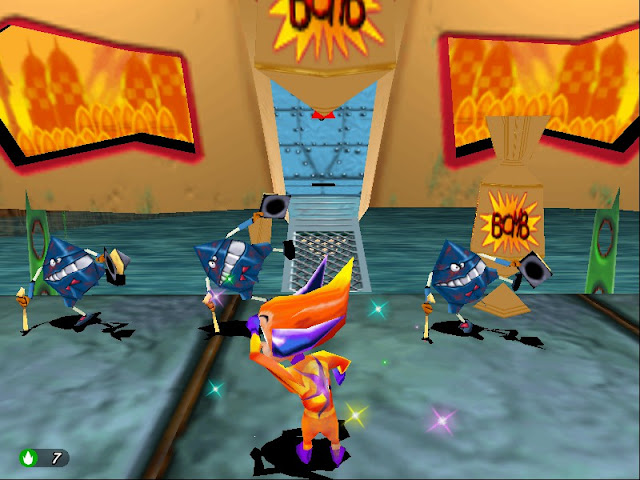Plebby Quest Review | Crusader Princes
Grand strategy games are notorious for being highly complex titles with a steep learning curve. If someone wanted to recommend a simpler take on the genre to a much less experienced player, the choice seems very slim. However, it can happen that a studio may come in with a product to fill that desire, and Plebby Quest: The Crusades is one such product.
Aesthetics
Even a bloody battle is made cute by the art style

Even a bloody battle is made cute by the art style
The 2d graphics have been drawn with a cutesy, highly stylized art style. The colors are lively but not exaggerated, and it's overall good-looking. A feature I appreciated is the clarity in which the game tells you how much liked you must be with a kingdom to make a trade/alliance agreement, cutting out the slack of trying to get a deal through trial and error.
The characters in the form of rectangles warp in a compelling way, with gestures representing their mood, like when they are angry and vibrate aggressively. The little yellow soldiers are expressive too when they swing their weapons, very clear and nice to see.
There isn't any voice acting, rather the characters make sound effects to communicate and share their thoughts, and the soldier when fighting squeak like a toy for dogs. Nothing particularly offensive or groundbreaking.
On the opposite side, the soundtrack fits really well, it changes based on where the player looks on the map, and there are a couple of tracks I really enjoyed, like the theme for the council, it gives a feeling of a place where nation-changing decisions are taken.
Summarizing, the technical compartment is compelling to both eyes and ears.
Game Mechanics
 |
The council is the prime place to execute schemes |
The title is a turn-based grand-strategy game with real time battles. There is a decent number of systems on offer, but none of them is too deep. I am going to describe some of the mechanics which I consider to be the most interesting. Firstly, the generals are your main tool, with them you do most of the actions possible and they can only execute one action per turn. Combat is probably the situation your generals are going to be used the most. The battles are executed on a single line in which 4 kinds of units( infantry, ranged, cavalry and medics) are going to clash. All of them have their advantages and disadvantages. For instance, cavalry can make a charge attack that deals massive damage to health and morale of the enemy, but after that they are going to rest for a bit and become vulnerable to attacks, cavalry also can't do a charge attack if they are on the front. There are 2 ways to defeat an army: either you kill every single troop or break their morale. Since most of the battles are sieges, there is also the added condition of breaking the walls, achieved by having a big enough army and decent siege equipment, it's entirely possible for a smaller force to hold out against a bigger one if they use their defenses smartly because walls deal huge morale damage to the attackers.
Another particularly interesting mechanic is the council in which kingdoms of the same religion reunite to discuss about problems of faith. In it, accusations to rival kingdoms can be executed, which can have lasting impacts, like accusing a kingdom of heresy, making its relationship with the others worse, or force two kingdoms at war to a truce. Once a player takes a position, it's possible to convince other kings by persuading them, threatening them at the cost of relationship, or bribe them with a diamond, manipulations and subtle cunning are masters here.
Lastly, diplomacy is remarkable because, besides the obvious bonuses such as trade and military alliances, you can execute proxy wars with your allied kingdoms, meaning that if you start an attack from one of their settlements to an enemy one, you will receive the experience and the spoils of battle while your ally will get the settlement itself.
There are been multiple instances where I was just about to quit and said to myself "I am so close to have a thing done, just one more turn won't hurt " and then a kingdom declared war on me, so because I had to deal with them I couldn't quit right away, then once resolved another problem showed up and of course THAT needed to be dealt with and so on. So yeah, this game has the "one more turn" feeling that good grand strategy games possess. Also, play the first scenario, it's going to explain all the basic mechanics, there is minor stuff I haven't touched on like monastery maintenance and religion.
Before passing onto the economy a small tip, hold the CTRL key to make the game go faster, very useful especially during the early bits with lots of kingdoms.
Moving on, there are 8 types of resources: money, wheat, horses, wood, sugar, pagan slaves, diamonds and holy relics, the last two being rarer than the rest. You get money by taxes, selling stuff to wandering merchants or spoils of war. Common resources are used for maintenance stuff and upgrading your troops, like the cavalry that consumes horses when either resting or upgrading them to a successive tier. Diamonds are used in diplomacy to boost the relationship between the player and another kingdom, or used during a council to bribe a fellow kingdom into voting a specific decision. Holy relics can be used to instantly level up a general through a pilgrimage or at the council to make a resolution be passed immediately. There are also research points, gathered by solving a tic-tac-toe like mini-game in the monastery, they are used to unlock new stuff, like better siege equipment or passive bonuses.
I don't have anything remarkable to say about the overall economy, if I wanted to nitpick I could state that the research mini-game could have rewarded more points, just to speed up the progress in the early game a bit.
About that, there are two main game modes who change the overall quest design: scenarios and free-mode. In the scenarios, there is always a series of main objectives to follow and once completed, the scenario is won. In free-mode there is only over-arching objective: conquer all cities. There are minor optional objectives that can be taken from time to time, they give small rewards when fulfilled and small penalties if failed.
I wished there were more victory conditions in free-mode, like reaching the end of a super expensive research path, having to conquer all cities every time feels boring, thought the developers tried to make the runs feel different using some restrictions/boons on specific kingdoms, like one who can only hire women generals. Still, I do suggest at least two runs in free-mode: one as a Christian kingdom for an experience full of intrigue, conspiracies and schemes; and one as a Muslim kingdom for an experience full of fighting and conquest. This is because there are huge penalties for fighting a kingdom of the same faith, to the point that the player risks to be temporary excommunicated and suffer mutinying generals or an angry populace, meaning respectively less possibility of action and less money if you go down the conquest path as a Christina kingdom.
Level design wise, there are fundamentally two maps to play on: the main one based on Europe and territories around the Mediterranean sea, and the "world of chaos" maps. The first one has fixated locations of kingdoms, while the second one is semi-random since it places the kingdoms in different position. There are fundamentally three kinds of settlements: cities, forts and bandits camps. Cities have for the most part basic defenses and produce money. Keep a watchful eye on the map, there are specific cities that can
produce one of the basic resources too, and there also are very
rare cities that produce diamonds. Forts are settlements with an advanced system of defenses, but instead of producing money, they cost an upkeep to maintain. Bandit camps are settlements inhabited by bandits and cannot be conquered, only destroyed. Another important detail is about the capitals(settlements with a flag), if conquered, the kingdom is defeated immediately, no matter the size. This means that if you rush, you can theoretically defeat a kingdom really fast, but is balanced by the fact that AI kingdoms can change the capital at will. The player can do it too, but requires a special item. Another thing is the semi-supply lines system implemented, meaning that if a settlement is cut off from the capital without any kind of road that connects them, that settlement will become neutral and ripe for the taking without needing to fight. Lastly, walls don't repair automatically and can't be repaired if an attack is commenced, meaning that it's possible to lose a settlement through a succession of Pyrrhic victories. Also, it's possible to attack only if there is a road connecting one of your cities or one of your ally to an enemy settlement. This is a double edged sword. On one hand, your progress is very slow, on the other one, it means that you could be at war with half of the world BUT, because of the road system, they have a very small window of attack and are unable to overwhelm you.
It was actually quite fun to fight in the ruins of fallen walls while keeping the army of the enemy at bay, attacking on the other hand was a bit of slog, the penalties to morale were the main source of failure, it frustrated me at the start, but then I changed my strategy, leveled up the troops and developed better siege equipment. In the end I was even able to conquer entire forts in only one attack. So, my advice is to be patient, with a bit of work everything will start to go smoothly.
As for the enemy design, there are of two kinds: enemy kingdoms and bandit camps. The kingdoms have the overall same tools as the player. The bandits don't take territory, but will harass nearby cities and sack the undefended ones. They can be destroyed, but only temporary, since the ruins of their settlements can't be conquered and after a while they will come back stronger. There is the chance for new kingdoms to spawn in, either in abandoned cities or when a city is at max unsatisfaction with an angry rabble leader in the city.
My biggest gripe is with the bandits for two reasons: control and playability. Firstly, I wish it was possible to occupy the origin territories of the bandits, like some sort of militarized outpost, so that instead of coming straight to back life, they would instead try to instigate rebellions in there and attack the outpost, to keep them at bay while I focused on other stuff. Though, I do understand why it's not done like this, it's to make sure that the player doesn't just get lazy or complacent, to make the player take care of the internal parts of the reign instead of only the war fronts. Secondly, I wish the bandits were playable, like, instead of focusing on empire building, the player would make raids in nearby territories and cause troubles to other kingdoms internally by instigating angry rabbles. I think that if worked on, this could be DLC material. For the rest, it's ok, I didn't feel frustrated dealing with the enemy kingdoms, they were a fair challenge.
Beating all 3 scenarios and 2 runs in free-mode, I played for 45 hours before abandoning the game.
Summary, lots of cool system, but none of them is too complex.
The general setting is based around 1174, with a heavy focus on crusades, holy wars and religion.
There are 3 scenarios in the main game plus 2 that can be added buying a DLC. All 5 stories happen around the same time. The events of the scenarios can intertwine, meaning that things that seem inconsequential in a scenario, may receive full reveal in the next.
As for the content of the scenarios themselves, they focus on the king/ruler of a particular kingdom and his/her struggles to achieve a goal. In the first one, a prince shall demonstrate his worthiness to the royal throne, in the second one a king must repay the crushing debt of his nation and in the last one, for the base game at least, the wife of the Holy Roman Emperor wants to make sure to get one individual elected pope.
They are entertaining, I felt compelled to see the end of each of them.
Besides the scenarios, there is the free-play mode in which there isn't a concrete narrative, rather the main appeal of this mode are the emergent stories that may sprung up. Some of the events that happen in scenarios can happen in the free-play mode too. For example, in one of the scenarios a rebel uprising happens, and that same uprising always happens in free-mode.
It's quite cool to see, it gives consistency to the events, and the emergent stories that came out amused me.
The tone and the characters follow a silly humor, with the dialogues having a feeling of friendly cheekiness between themselves. The jokes don't always land perfectly, but I didn't feel like they were unbearable.
While the game is set in an historical setting, it doesn't care about historical accuracy at all, to the point that the developers added a disclaimer in the main encyclopedia pointing out their own inaccuracies. For instance, in the second scenario, one of the advisors for the protagonist is Niccolò Machiavelli(or, as he likes to sign himself when he writes a book, Maki-chan). This is of course ridiculous since he was born in 1469 while the game is set around 1174. It's anachronistic and the developers admit that in the encyclopedia, they did this so they could make some humorous scenes using a "cynical administrator character".
In conclusion, not a bad choice if you are looking for a light-hearted experience, just don't come in expecting historical accuracy, this game doesn't offer it nor it wants to.
Recommendation:
Plebby Quest aims to satisfy a niche of newbie users who want to approach the grand strategy genre for the first time and, with a set of good but not too complex mechanics and decent stories, I think it manages to.
Available on Steam.




Comments
Post a Comment